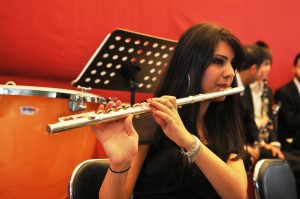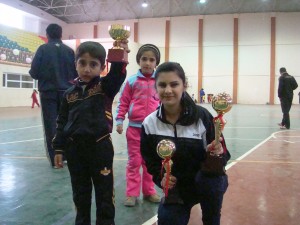Musician, teacher – or both?
Once you’re in your fifth year of studies to become a teacher in Iraq, you start training in a primary school or a kindergarten. It takes about forty days, and on some of them, your professors come to the class and evaluate your teaching. When they’re there, it’s important to give an exam that shows off your abilities and what have you learned during those five years.
It can be confusing because we’re expected to be both good teachers at the primary level and good artists. I guess that would work if we could teach what we had learned, but we can’t. Artistic knowledge and theory still aren’t part of the basic curriculum in schools. Plus our professors don’t follow any set curriculum, and there’s not a settled method for approaching music like there is in other subjects. So that leads to some misunderstandings between the institute’s management and education ministry. They need to clarify what they want from us. The ministry asks the institute to produce teachers, but the institute wants us to be both teachers and artists without having a good curriculum for combining the two.
I talked with two of my friends about their studies at the arts institute we attended. Lana, a 22-year-old flutist who graduated in 2010, started by saying that in the first two years she was very happy that her family didn’t stop her from coming to the institute and studying her dream subject, music. But she got bored by the time she was a third year student. She was expecting something other than what she got.
“I have no idea why should I study so many extra subjects. Do I need to learn my native language if I want to be a flute player?” she said in surprise.
She also talked to me about the training she did at a kindergarten.
“I had to do everything for the kids: Play music for them, be a storyteller, take them out for recess and whatever else the management required. I had no problem doing all of that, even though it wasn’t really my job. I felt really satisfied that the kids liked me to be everything for them,” Lana said.
Now she’s a member of the Ranya Symphony Orchestra, and she certainly doesn’t have any problems with her native language when the conductor is talking, she told me with a laugh.
I talked to another girl who didn’t want me to mention her name or any other personal information. She said that her family reluctantly agreed she could study music. But when she was asked to travel to another city for a concert for school, her parents got angry and didn’t let her go.
“That was a very hard moment for me, but I had no choice. I pretended to be sick and said I couldn’t play the concert. My family has always prevented me from taking part in musical activities. That’s why I could not make much progress with my studies. I graduated with very low marks, but despite that, I was almost happy that the institute’s directors showed some consideration for me,” she told me sadly.
As artists, we are happy that we can present art to people and gradually introduce them to ways of understanding it, but we still have work to do in supporting women who are interested in art and music.





